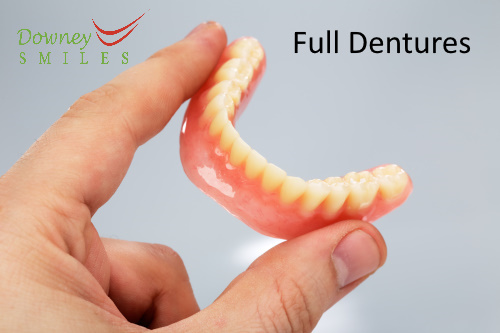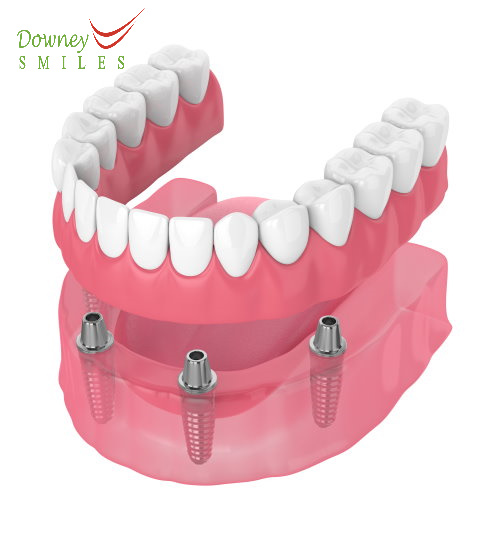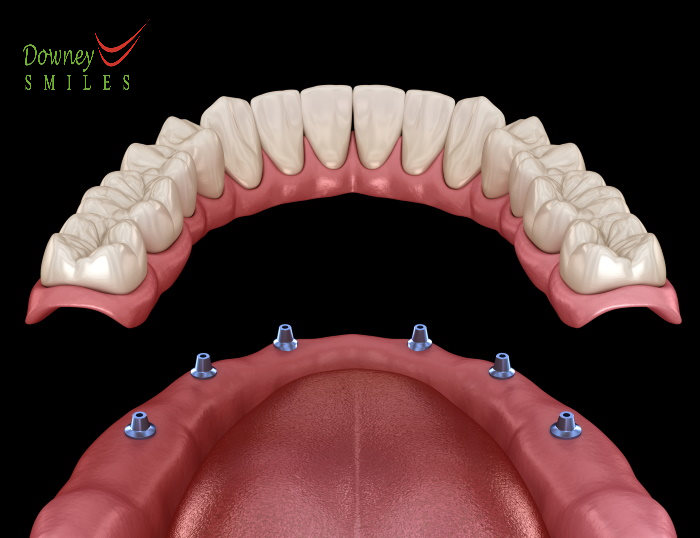 Full dentures or complete dentures are a type of denture that covers the entire mouth. A full denture will be utilized if your complete upper or lower teeth have to be extracted or replaced. Full dentures are classified into two types: immediate and conventional. Your full dentures dentist will recommend the best type of denture based on your health and needs. Dr. Amit Shah has been treating patients with dentures since 2002 and have expert advice on what type of full dentures will fit for you.
Full dentures or complete dentures are a type of denture that covers the entire mouth. A full denture will be utilized if your complete upper or lower teeth have to be extracted or replaced. Full dentures are classified into two types: immediate and conventional. Your full dentures dentist will recommend the best type of denture based on your health and needs. Dr. Amit Shah has been treating patients with dentures since 2002 and have expert advice on what type of full dentures will fit for you.
Table of Contents
What are Full Dentures?
A full denture, often a complete denture, is an acrylic, dental porcelain, or ceramic prosthetic device. It is a detachable prosthesis that replaces the full set of lost teeth on the upper or lower jaw.
What are the types of Full or Complete Dentures?
Full dentures are classified into two types: immediate and conventional.
Immediate Dentures
Immediate dentures are used until conventional dentures are needed. Following tooth extraction, immediate full dentures are utilized to protect the gums and allow them to recover completely.
Conventional Dentures
Conventional dentures are your permanent dentures, so they appear to be your natural teeth. Conventional dentures are manufactured to suit your mouth perfectly and are custom-made for you.
What is an Overdenture?

An overdenture is a type of denture held in place by dental implants. Instead of being glued to your gums, these dentures snap into dental implant attachments, offering more stability than conventional dentures and helping to preserve bone density in the jaw.
Fixed implant-supported overdenture

A fixed implant-supported overdenture is identical to an implant-supported overdenture, except that it is fixed and cannot be removed. It is the most stable form of overdenture; however, it might be challenging to clean because the dentist can only remove it.
Bar-retained implant-supported overdenture

A bar-retained implant-supported overdenture is fastened to the implant and allows the denture to be affixed to it. This design enables the denture to clip on and off the implants as needed, providing greater security than traditional dentures.
Ball-retained implant-supported overdenture

A ball-retained implant-supported overdenture is an overdenture with a ball-shaped abutment. This design provides greater stability and usefulness than traditional dentures and is a suitable choice for the lower arch, where two or four implants are often placed in the jawbone.
How does the Full Dentures Process Work?
Dentures are produced just for you; thus, a process is followed to achieve a perfect fit, aesthetics, and function. The following steps are commonly involved in the whole denture procedure.
- A dental exam. A dental checkup is an initial step in establishing the condition and health of your teeth. Throughout the evaluation, we will search for any symptoms of illness, tooth decay, or past dental treatment that might interfere with the denture procedure. Before fitting the dentures and extracting them, we will also look for any teeth that need to be removed.
- Making dentures. Once we determine that you are a good candidate for full dentures and that your gums have healed completely, we will take a mold of your teeth and measurements to guarantee that your dentures fit perfectly. These measurements are forwarded to the lab, which will fabricate the dentures according to the requirements.
- Fitting the dentures. Our office will contact you for a fitting once the dentures are completed. When you wear it, you should not feel any discomfort or have any other problems. We next make any required changes to your dentures.
You will need some time to adjust to wearing your prosthesis. You may have some trouble eating and speaking with it at first, but if you’re properly used to your dentures, it will have the same function and control over your teeth.
Make an appointment with Dr. Kurt Tran DDS at Best Smiles Dental!
* FREE Dental Implant Smile Consultation ($100 Value)
* FREE Digital X-rays especially for Tooth Implant ($150 Value)
* We Maximize your Insurance so you pay less out of pocket.
* 0% Interest Financing for 18 months
How long does it take to get Full Dentures?
It usually takes six to three months, but it might take longer, depending on if you need any teeth pulled, the recovery period, and other variables. Because each denture is custom-fit to a person, there is no set schedule for receiving complete dentures.
What are common problems with Full Dentures?
New dentures take time to adjust to, and it is usual to experience problems before they feel natural and comfortable in your mouth. The following are the most prevalent full denture issues.
- During the early phases of the adjustment period, soreness and discomfort are expected. The pain and irritation are frequently caused by new dentures pressing against your mouth.
- As you get acclimated to your new dentures, they will feel unusual in your mouth, making it difficult to talk normally.
- Most patients have difficulty regularly eating because their mouths are still adjusting to the dentures or because their gums are mending.
- Slipping dentures are expected, especially if your mouth is still adjusting to them. During this period, the dentures are easily dislodged when eating or talking.
Am I a Good Candidate for Full Dentures?
Full or full dentures are appropriate for patients who have lost most of their teeth. In other circumstances, however, dentures may not be the ideal solution for patients. A list of candidates for complete dentures is provided below.
- You have healthy gums and a strong jawbone.
- You are not a good candidate for dental implants.
- You have a tooth that is damaged, fractured, or decaying.
- You have trouble chewing meals.
- You have low self-confidence because of your missing teeth.
For Overdentures, you will also need to have these qualifications.
- You should be in good general health.
- You should have good dental health.
- You should have an adequate quantity of jawbone.
- You have several missing teeth.
How long do Full Dentures Last?
According to The Journal of the American Dental Association, full dentures and overdentures endure an average of ten years. During this period, your mouth and dentures may change significantly, affecting their fit and look. Have your dentist evaluate if you’ve been wearing your dentures for longer than their anticipated lifespan.
What do Full Dentures look like?
Full dentures are artificial teeth and gums that are designed to mimic the form of natural teeth. Your complete dentures will seem quite similar to your natural teeth.
How much do Full Dentures Cost?
Traditional dentures cost an average of $1800 without insurance but anticipate paying between $1,000 and $3,000. The cost of complete dentures is determined by the type you select.
Overdentures cost the same as implants and dentures. The typical cost of 4-6 implants is between $4,000 and $18,000. Dentures typically cost between $1,000 and $3,000.
Immediate dentures range in price from $1,000 to $3,000 each arch.
FAQs for Full Dentures
How many teeth are in a full set of dentures?
While 20 teeth are typically considered the bare minimum, some dentures include up to 28 to offer sufficient support for a healthy bite. More teeth make you seem better when you smile, and they also support the soft tissues in your face, such as your teeth, muscles, and skin, and help you prevent the sunken look.
Can I have all my teeth pulled and get false teeth?
Yes, this is known as Immediate Dentures, which may be fitted as soon as the remaining teeth are taken. They are often formed from imprints taken a month before the teeth are pulled. Patients love this procedure since it eliminates the need to be toothless for an extended period. They will, however, require relining or corrections as the gums and jawbone recover.
Areas we Serve
Our office serves the following communities.
